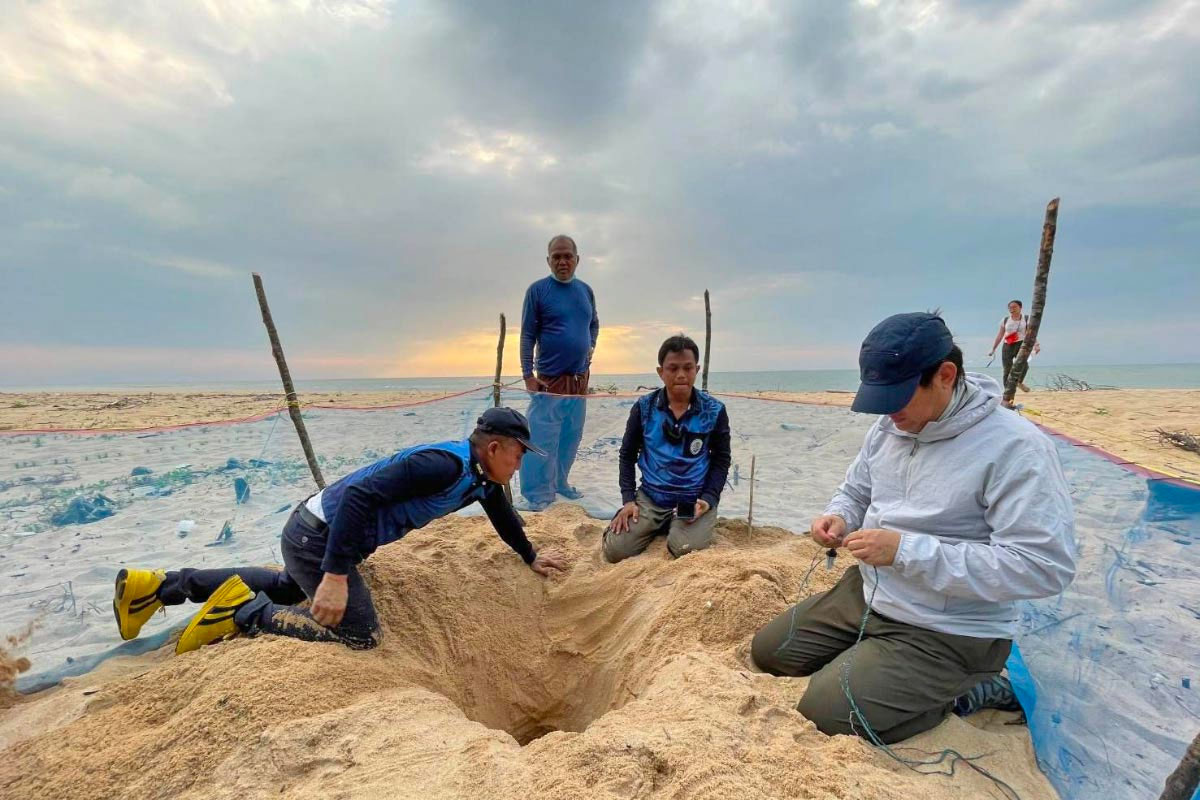The first month of 2021 has been exciting for marine wildlife officers in Phuket and Phang Nga as leatherback turtle eggs have been spotted on these provinces’ beaches. Leatherback sea turtles are the largest turtle species named after their unique leather-like shell.
Currently, the International Union for Conservation of Nature (IUCN) has categorized leatherback sea turtles under the vulnerable status, which means they are likely to become endangered. The sightings of leatherback turtle nests are much-welcomed news as these can improve the survivability of these creatures and can show how tourism and wildlife can co-exist.
Leatherback turtle lays eggs on Kata Beach

After decades of absence, a large leatherback turtle was sighted in Kata Beach, one of Phuket’s best beaches, last January 1. The Department of Marine and Coastal Resources (DMCR) has reported that the turtle was around 150cm in length, 119cm in width, and is estimated to weigh around 300kg. When the turtle made its way back to the sea, officials located its nest where it laid around 50 to 60 turtle eggs. A thermometer has been installed to monitor the nest’s temperature and officials have been ordered to guard the area.
Turtle nest spotted on Mai Khao Beach

Sirinath National Park officials, together with park officers from Khao Lampi Hat Thai Mueang National Park and representatives from Phuket Marine Biological Centre (PMBC), have located a nest in Mai Khao Beach, Phuket last January 12. To allow the eggs to naturally hatch, marine life experts from PMBC avoided moving the eggs and were therefore unable to count them. The nest site has then been fenced off and guarded to ensure that it is undisturbed.
Baby turtles hatch in Phang Nga’s Bang Khwan Beach

On January 17, DMCR reported that the turtle eggs in a nest found in Bang Khwan Beach have successfully hatched. The nest was found last December 2020 and has been closely monitored by the DMCR since then. Officials report that 58 healthy baby turtles were found and released to the sea. Eleven more baby turtles were taken into care until they are deemed strong enough to make their way back to the sea.
Two more nests from other sea turtle species located in Phang Nga

Meanwhile, two other nests have been found on Thung Dab beach last January 16. Officers believe that the first nest was laid by an olive ridley sea turtle – another species listed as vulnerable by the IUCN. The other nest is believed to have been laid by a green sea turtle which has already been listed as endangered species. Both nests are currently being protected and monitored by DMCR officials and are expected to hatch in early March.
Sea turtle sightings linked to lack of human activity
Last year, Thailand has seen the largest number of turtle nests in two decades. In Phuket alone, researchers have found a total of 11 sea turtle nests. Environmentalists link this development to the lack of human activity on Phuket’s popular beaches as the island has been under lockdown due to the COVID-19 outbreak.
A representative from Mai Khao Marine Turtle Foundation, Kanokwan Homcha-ai, believes that the lockdown and movement restrictions imposed by authorities will give marine life some time to regenerate. In a phone interview with CNN, Homcha-ai shared, “This may have positive impacts on the environment in marine conservation in the long term as well. Not just sea turtles, but other marine species such as dolphins and dugong that live in the region have also increased in numbers according to a government survey, such as hermit crabs and other food sources for marine animals.”

Conservationists hope that positive environmental developments like these will encourage and inspire the tourism sector including hotels, resorts, and private villas in Phuket and around Thailand to work hand in hand with government agencies and continue their responsible tourism practices – where wildlife, especially endangered species, can continue to thrive and multiply in numbers.
Phuket is already home to several wildlife sanctuaries and rehabilitation centers that are focused on practicing ethical tourism and conservation of species. Many of these organizations have been supported by the private tourism sector such as the Mai Khao Marine Turtle Foundation which was launched under the funding of some of Phuket’s resort and hotel groups.
………………………………………
Featured photo: DMRC



